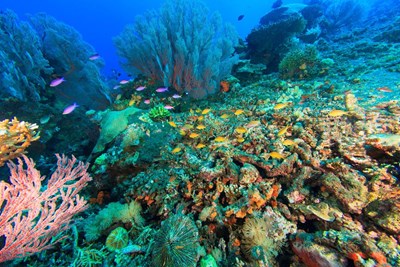
Our SEA LIFE workshops provide a unique opportunity to honor, help protect, and conserve our world’s shared oceans.
Our workshops have a cross-curricular approach, with particular focus on:
- Science (Adaption, Inheritance, Evolution and Variation, Biological Processes, Marine Wildlife, Welfare and Conservation)
- Geography (Oceans Around The World, Ocean Habitats, Human Impact on the Ocean)
- Literacy (Comprehension and Inference, Reading, Creative Writing Inspired by Wildlife)
- Don't forget to download your pre and post classroom activities


Homes in the Sea Workshop
Recommended Ages: Preschool - Kindergarten
Workshop Description: Visit creatures at home in the sea! Together we will dive into a world of amazing discovery to explore the fascinating and diverse habitats in our world’s ocean, and the animals that call them home! Students will discuss what we as humans need to survive, and how animals and all living things have similar needs, then dive in to explore just what makes the perfect underwater home for some of the world’s most amazing creatures.
Life Science: From Molecules to Organisms: Structures and Processes. Use observations to describe patterns of what plants and animals (including humans) need to survive
Earth and Space Sciences: Earth and Human Activity. Use a model to represent the relationship between the needs of different plants and animals (including humans) and the places they live
TEKS Covered:
K Science 112.11
7B, 9A, B, 10B
- Pre-Visit Classroom Activity: Rockpool Habitat
- Pre-Visit Classroom Activity: Sea Urchins
- Post-Visit Classroom Activity: Sharks
- Post-Visit Classroom Activity: Make Your Own Aquarium

Sea Creatures Workshop
Recommended Ages: 1st – 5th grade
Workshop Description: Invite students to learn about some of our core SEA LIFE creatures! Together they will dive into a world of amazing discovery to learn about three core creatures: sharks, jellyfish and seahorses – understanding their different needs and completing exclusive SEA LIFE quizzes for each. Students will think about the importance of animal welfare and use the core aquarium standards to create tanks for the different creatures, based on their understanding of creatures’ needs and happiness markers.
Life Science: From Molecules to Organisms: Structures and Processes. Use materials to design a solution to a human problem by mimicking how plants and/or animals use their external parts to help them survive, grow, and meet their needs
Life Science: Biological Evolution: Unity and Diversity. Make observations of plants and animals to compare the diversity of life in different habitats
Life Science: From Molecules to Organisms: Structures and Processes. Construct an argument that plants and animals have internal and external structures that function to support survival, growth, behavior, and reproduction
Life Science: Biological Evolution: Unity and Diversity. Construct an argument with evidence that in a particular habitat some organisms can survive well, some survive less well, and some cannot survive at all
TEKS Covered:
1st Grade Science 112.11
7B, 9A-C, 10A
2nd Grade Science 112.13
7B, 9A-C, 10A
3rd Grade Science 112.14
9A, 10A
4th Grade Science 112.15
10A
5th Grade Science 112.16
9A, 10A
- Pre-Visit Lesson Plan: Incredible Sea Creatures
- Post-Visit Lesson Plan: Sea Creatures Creative Writing

Sea Defenders Workshop
Recommended Ages: 3rd – 5th grade
Workshop Description: Invite students to become Sea Defenders! They will investigate it is important to protect our oceans, raising awareness of their own relationships with the ocean and how their daily actions can positively or negatively affect the marine environment. Students should be inspired to make changes in their lifestyle and actively contribute towards solutions.
Biological Evolution: Unity and Diversity. Construct an argument with evidence that in a particular habitat some organisms can survive well, some survive less well, and some cannot survive at all.
Biological Evolution: Unity and Diversity. Make a claim about the merit of a solution to a problem caused when the environment changes and the types of plants and animals that live there may change.
Earth and Human Activity. Obtain and combine information to describe that energy and fuels are derived from natural resources and their uses affect the environment.
Earth and Human Activity. Obtain and combine information about ways individual communities use science ideas to protect the Earth’s resources and environment.
TEKS Covered:
3rd Grade Science 112.14
7C, 9B
4th Grade Science 112.15
7C, 9B
5th Grade Science 112.16
9A, C

Habitat Explorers Workshop
Recommended Ages: 6th - 8th grade
Workshop Description: Invite students to become Habitat Explorers as they dive deep underwater into the ocean habitats of some of our SEA LIFE creatures! Together they will jump into a world of amazing discovery to learn about the different zones of the ocean and the creatures that live there. Thinking about habitats and adaptation, students will consider the challenges of different micro-habitats in the ocean, matching creatures and their adaptations to the different zones that they discover, and eventually creating their very own sea creatures!
From Molecules to Organisms: Structures and Processes. Construct a scientific explanation based on evidence for how environmental and genetic factors influence the growth of organisms
Ecosystems: Interactions, Energy, and Dynamics. Analyze and interpret data to provide evidence for the effects of resource availability on organisms and populations of organisms in an ecosystem
Ecosystems: Interactions, Energy, and Dynamics. Construct an argument supported by empirical evidence that changes to physical or biological components of an ecosystem affect populations
Earth and Human Activity. Apply scientific principles to design a method for monitoring and minimizing a human impact on the environment
Earth and Human Activity. Construct an argument supported by evidence for how increases in human population and per-capita consumption of natural resources impact Earth’s systems
TEKS Covered:
6th Grade Science 112.26
12A
7th Grade Science 112.27
11B, 12B
8th Grade Science 112.28
12C
- Pre-Visit Lesson Plan: Layers of the Ocean
- Post-Visit Lesson Plan: Inheritance and Variation
Ready to Book?
If you require further information on school visits please contact our booking team. We'll be more than happy to provide all the information you need to ensure your students have a memorable, inspiring experience. Email: SAGroups@merlinentertainments.biz
SUBMIT BOOKING REQUESTReceive classroom content & latest news!
Subscribe to our Educator Newsletter and stay connected. We'll deliver our newest teacher resources, keep you in the know of any special offers, educator event invites, friends and family discounts, giveaways and more!

Please note the newsletter signup below is for general consumers, our Educator Newsletter is tailored to meet your needs! Please subscribe with the link above.